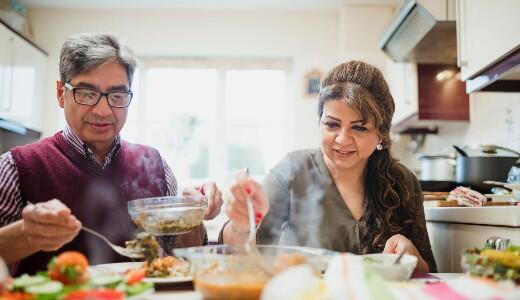Helping us to understand the role of carers

Join the Involvement Network
If you haven't already, join our involvement network. You'll be sent the latest opportunities to get involved in our work, like helping us to understand the role of carers, plus many more! There's also news and updates from the team.
The Health Information team inform and engage the public on how to reduce the risk of cancer, and the importance of early diagnosis and screening. This new project looks at the role of unpaid carers in helping those they look after to access and understand health information about cancer.
Unpaid carers are in a unique position, as they often must consider and share information or make health-related decisions on behalf of those they look after. They can also play an integral role in helping those they care for prevent cancer and get diagnosed earlier as well as helping to increase the uptake of cancer screening.
It's more important than ever that we take the time to understand the experiences of unpaid carers to ensure our health information is reaching those most in need.
People that need unpaid care tend to be older and/or people with disabilities. Also, the amount of people requiring care is increasing due to the ageing population, and more people with disabilities are reaching an age where cancer risk is increased. This means many people with carers are likely to be at a higher risk of cancer, and face unfair differences in care across the entire cancer pathway - particularly in terms of accessibility and literacy.
Gathering insight
After doing initial desk-based research, the team ran an in-depth discussion with unpaid carers, both with and without an experience of cancer, to understand:
- If and how carers find and use relevant health information
- Whether further resources are needed in this area
- How carers help people to make positive choices about their health
They spoke to a diverse group of unpaid carers, who cared for people with a range of needs, including dementia, autism, diabetes and old age so they could explore a whole spectrum of experiences.
The session helped us to understand how carers perceive their role to help those they care for to access health information, as well as what further support, they'd like to access. Carers’ general experiences were also covered, including their interactions with health care professionals and the healthcare system.
What we learnt
From our discussion with unpaid carers, we identified the following key themes:
The ability to identify as a carer. Society needs to help people identify themselves as an unpaid carer, to ensure they can access all the benefits, resources and support potentially available to them.
Competing carer responsibilities. People will often have multiple priorities to juggle alongside their caring responsibilities. It’s important that these pressures and issues are considered when recommendations are made.
Attitudes to cancer. Those being cared for often lack understanding and engagement with the topics of cancer prevention and early diagnosis. The lack of culturally relevant resources often makes this harder. Talking openly about cancer can help tackle stigma, and young carers could play a key role.
Sense of responsibility. When it comes to spotting or communicating bodily changes, carers can often feel responsible for, or feel pressure to have these sensitive discussions. It’s felt that there’s a lack of formal support for carers, and the burden often falls on carers themselves to locate and understand information.
Resources and support. There’s a lack of general carer support and formal training. There’s also a need for more diverse and culturally relevant resources across conditions. Carers needs are diverse and it’s important that content can be accessed in a range of places from social media content to schools, to places of worship.
How we’ve used the insight and next steps
From this project, Cancer Research UK now has a better understanding of the challenges in this space and can begin to work to ensure that carers have access to the best information and support available. Results, learnings and recommendations have been shared across the charity. Findings have also fed into a wider approach to improve help-seeking journeys and reduce inequalities. It will also provide a foundation for future research and work in this area.
Thank you to all of those who were involved in this work. Your insights are invaluable.
